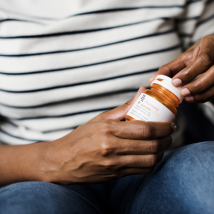Researchers at ARC EoE have developed a toolkit to improve quality of life for patients with multiple long-term conditions by reducing the use of opioids to manage chronic pain.

The toolkit has been making an impact in the Norfolk and Waveney Integrated Care System to improve care and address rising prescribing rates, resulting in a significant reduction of 3.9% or 939 patients between April 2022 and March 2023.
Although opioids are highly effective for short-term pain management, they have limited benefits for long-term chronic pain control and can cause a range of harmful side effects.
Healthcare professionals in the Medicines Optimisation Group East Anglia identified opioid prescribing as a priority for health research to address and applied for ARC EoE funding and support to review the situation and evidence for best practice.
The applied research team was led by Debi Bhattacharya, Professor of Behavioural Medicine at the University of Leicester and honorary professor in the School of Pharmacy at the University of East Anglia, to find a way to support prescribers to reduce and stop opioids for patients experiencing no benefits from them. Debi explained:
"The ARC EoE funding supported us to undertake a realist review combining evidence from literature with learning from organisations across England, in terms of what they have tried to help prescribers to taper and stop opioids. We then worked with patients and healthcare practitioners to make sense of our findings to establish what works and why."
Professor Debi Bhattacharya, ARC EoE researcher
These findings were published in the British Journal of Clinical Pharmacology and Prescriber journal in May last year. This work uncovered a toolkit of five key components that were already working to effectively reduce opioid prescribing across the country, but no organisation was combining all five components.
The Toolkit for tackling chronic opioid use in non-cancer pain is available to download from the University of East Anglia. It details these five components for organisations to support their prescribers to reduce opioid prescribing:
- Generate a clear expectation that opioid tapering is the role of prescribers.
- Develop a care pathway within existing resources to permit timely access to non-pharmacological interventions.
- Create a consistent approach by all members of the healthcare team in supporting patients to taper and stop opioids.
- Provide prescribers with the knowledge, skills and confidence to initiate tapering discussions and manage psychological consequences of tapering.
- To align patient and prescriber expectations of tapering.
The next phase involved an implementation project to apply this toolkit in Norfolk and Waveney, supported by the Eastern AHSN (Academic Health Sciences Network), now Health Innovation East. The project team worked with a large, diverse group of people including patients, prescribers in primary care, hospital pain clinic team members and social prescribers to design the approach to roll out the toolkit successfully.
Debi continued: “Before implementing the toolkit, we needed to tailor it for Norfolk and Waveney and co-design our care pathway. This included establishing our pain clinic’s capacity for referrals, mapping existing support services such as acupuncture and agreeing thresholds for referral to the pain clinic.
“It also takes time to build relationships with the community and partners to engage them in the project and maintain momentum. Patients worked with us as active members of the task and finish groups established by Health Innovation East.
"One patient group member said that they valued being involved in agreeing the final care pathway and designing something that will directly impact on their care and those of people within their region."
Professor Debi Bhattacharya, ARC EoE researcher
“Collaborating with ARC EoE and Health Innovation East made it possible to translate our empirical research into the real-world healthcare environment, which is a sizeable challenge! I was shocked by how much resource and time is required on the pathway to implementation, which still continues, and I am grateful for the scientific knowledge from our ARC EoE research associate and the project management and implementation expertise provided by Health Innovation East, which really helped us build momentum.”
The results of the final evaluation will be reported in December this year, and the project team has observed a continuing reduction in opioid prescribing and is exploring how to capture patient feedback and outcomes.
Sophie Knight, Health Innovation East Principal Advisor supporting the project said: “Following some promising results in Norfolk and Waveney, we await the full evaluation to explore future potential to spread the opioid deprescribing project and align it with national policy and developments in this area.
"We estimate that for every 62 patients with chronic pain who can be supported with alternatives to long-term opioid analgesia, one life can be saved. With a reduction in prescribing of 3.9%, this equates to 15 lives saved over the last year based on national AHSN data. We will continue to evaluate the full impact of this work.”
Sophie Knight, Health Innovation East Principal Advisor
Through ARC EoE and Health Innovation East support, this project has established a pathway for national rollout and evaluation. This regional work has been adopted by the national Patient Safety Collaborative programme so now data on impact and progress of the toolkit is reported quarterly.
- Find a summary of this project with ARC EoE’s Ageing and Multimorbidity research theme here.
- For more details on the implementation project and how the toolkit was tailored bespoke to each organisation, visit the Health Innovation East website.

